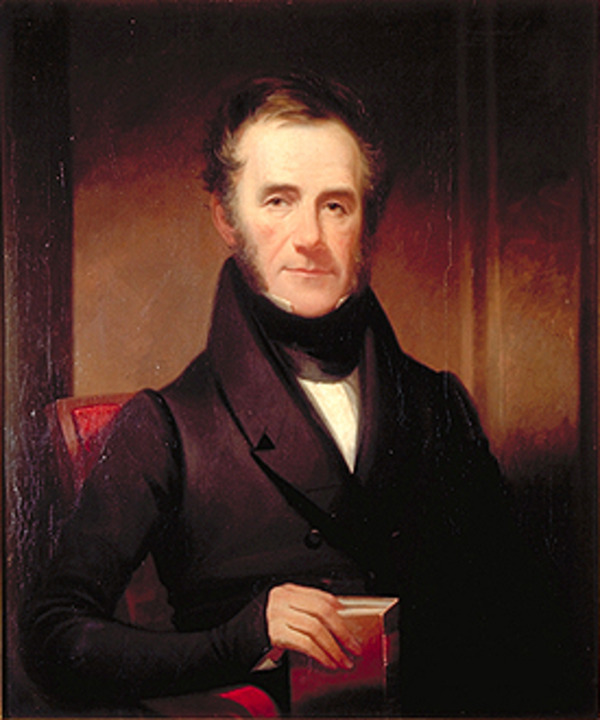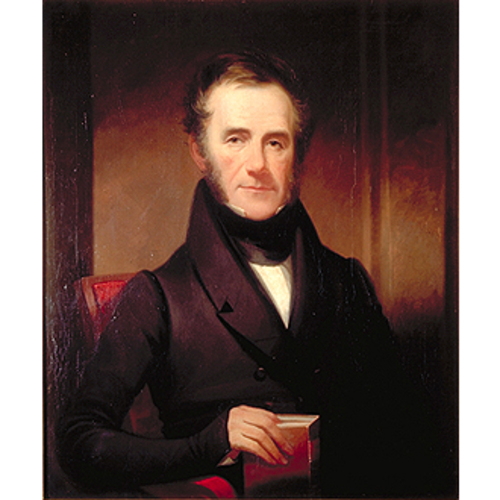
Source: Courtesy of Wikimedia Commons
FROTHINGHAM, JOHN, merchant; b. June 1788 in Portland, Maine, son of Judge John Frothingham of the Massachusetts Superior Court and his wife Martha; d. 22 May 1870 in Montreal.
John Frothingham was thrown on his own resources at an early age. He entered the hardware firm of Samuel May in Boston and in 1809 was sent to Montreal to open a branch outlet. On his arrival he joined a small but growing group of Americans, mainly from New England and New York, who were involved in Montreal’s expanding commerce. Although the American community of Montreal experienced some social and business discrimination after the War of 1812 it continued to grow and prosper. Frothingham himself suffered early business setbacks but re-established himself in the hardware business in partnership with his younger brother, Joseph May Frothingham; the latter died at age 32 in 1832. In 1836 Frothingham formed a partnership with William Workman*, and their firm became the largest hardware and iron wholesale firm in British North America. In 1853 the partners moved to larger premises and about the same time began to manufacture some of their own merchandise.
Frothingham was a promoter and shareholder in a number of companies and associations that were formed during the expansion of the 1840s, among them the Montreal Board of Trade, the St Lawrence and Atlantic Railroad, the Montreal Stock Exchange, and the Canada Inland Steam Navigation Company. He was also associated with the British and Canadian School of Montreal and the Montreal Horticultural Society. His principal outside business interest, however, was the City Bank of Montreal. Formed in 1831, it was the first to be successful in breaking the monopoly of the Bank of Montreal in the city. The Montrealers who formed the new bank may have been unable to secure credit from the Bank of Montreal, but the early shareholders’ lists suggest that the American investors, mainly from New York, who supplied most of the initial capital were motivated by a desire for profit. Frothingham was associated with the bank from its origins, along with John Molson*, William Ritchie*, François-Antoine Larocque, Thomas A. Begley, Joseph Vallée, John Easton Mills, Stanley Bagg, and William Lyman – a group consisting mainly of Americans and French Canadians. Frothingham held a substantial quantity of the bank’s stock; he served on its board for at least 16 years and was president from 1834 to 1849 when he resigned. The bank had sustained heavy losses in 1849 and he may have felt that he had to assume personal responsibility. He was succeeded as president by Workman.
As his business affairs prospered, Frothingham, like many of his more successful colleagues, adopted a grand style of living. During the 1840s, when it was becoming fashionable among the local merchants to move from their dwellings above the Rue Saint-Paul shops to large homes on the slopes of Mount Royal, Frothingham built the baronial mansion Piedmont, which was used as the governor general’s residence when parliament met in Montreal.
Frothingham was not involved in politics at either the provincial or the municipal level, and was content, it seems, with a business role. His diary, which he kept for many years, reflects only passing interest in current political affairs. His son John joined the business and in 1859 Frothingham retired to live quietly on his estate. A Presbyterian, he was a generous contributor to the Protestant schools of Montreal, to Queen’s College at Kingston, and to McGill University. Two sons, and a daughter, Louisa Goddard, wife of John Henry Robinson Molson, survived him.
McCord Museum, Antiquarian autographs. PAC, MG 27, I, E10A. Private archives, J. I. Cooper (Tillsonburg, Ont.), John Frothingham diary. Can., Prov. of, Statutes, 1841, c.90, c.97; 184–45, c.25; 1852–53, c.146; 1857, c.169; 1859, c.122; Legislative Assembly, Journals, 1843, II, app.S. L.C., Statutes, 1833, c.32; House of Assembly, Journals, 1835, app.J. Gazette (Montreal), 10 Feb., 8, 15, 19, 29 March 1831; 12 March 1849; 23 May 1870. La Minerve, 25 mai 1870. Montreal Herald, 23 May 1870. Montreal Transcript, 15 Feb. 1840. Pilot (Montreal), 2, 5 April 1844; 11 May 1853. Lower Canada almanack . . . , 1840. Montreal almanac . . . , 1839. Montreal directory, 1841–50. G. J. J. Tulchinsky, “The Montreal business community, 1837–1853,” Canadian business history, selected studies, 1497–1971, ed. D. S. Macmillan (Toronto, 1972), 131.
Cite This Article
Gerald Tulchinsky, “FROTHINGHAM, JOHN,” in Dictionary of Canadian Biography, vol. 9, University of Toronto/Université Laval, 2003–, accessed December 17, 2025, https://www.biographi.ca/en/bio/frothingham_john_9E.html.
The citation above shows the format for footnotes and endnotes according to the Chicago manual of style (16th edition). Information to be used in other citation formats:
| Permalink: | https://www.biographi.ca/en/bio/frothingham_john_9E.html |
| Author of Article: | Gerald Tulchinsky |
| Title of Article: | FROTHINGHAM, JOHN |
| Publication Name: | Dictionary of Canadian Biography, vol. 9 |
| Publisher: | University of Toronto/Université Laval |
| Year of publication: | 1976 |
| Year of revision: | 1976 |
| Access Date: | December 17, 2025 |



